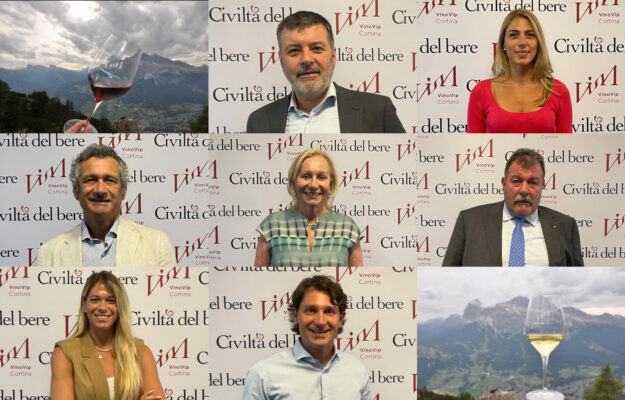Optimism is there, but more as a moral imperative of those who do business, than motivated by the reality of the moment. Which for the wine market is still full of difficulties, although with some positive signs coming mainly from exports, at +7% in the first 4 months of 2024 over 2023 in value, at 2.5 billion euros, and +5.8% in volume, according to Istat data analyzed by WineNews, and by out-of-home consumption in Italy, also aided by the tourist season, while the large-scale retail sector is still struggling and declining (except for sparkling wines), from Circana data, with sales down -1.9% in volume in the first 6 months of the year, and +1.4 growth in value, but linked only to inflation. Which continues to be one of the most important problems also weighing on wine consumption and the sector, due to the erosion of consumer purchasing power and above all, some point out, due to the cost of money, which is holding back not only consumption itself, but also business investment, which is essential to restart and grow. In a picture where entrepreneurs are trying to manage change, and work on value and price positioning, also to recover or maintain profitability levels that have suffered a major erosion in recent years, especially after the Covid and the war between Russia and Ukraine that have increased production costs. And while Italy is doing a little better for some at the moment, and others are doing more work abroad, many are looking at opening up new, as yet untapped markets, or cultivating growth in emerging ones, to cope with a decline in consumption that in the more historic and structured markets seems slow and inexorable. Too early to say that the worst is over, then, for Italian wine, but with an eye on the future that can only strive to think positive. This is the sentiment, with many different nuances, of some of the leading Italian producers met, by WineNews, at “VinoVip” 2024, in Cortina, the biennial event of the historic magazine “Civiltà del Bere”. Such as Raffaele Boscaini, at the top of Masi Agricola, among the reference realities of Valpolicella, Marianna Velenosi, who with her mother Angela leads Velenosi, among the most prestigious wineries between Marche and Abruzzo, as well as Umani Ronchi led by Michele Bernetti. And again, Marilisa Allegrini, who with Marilisa Allegrini puts together Villa della Torre in Valpolicella, San Polo in Montalcino and Poggio al Tesoro in Bolgheri, passing through Luca Rigotti, at the helm of Mezzacorona, among the most important cooperatives in Trentino and Italy, Marzia Varvaglione, who with Varvaglione 1921 is among the references in Puglia, and Alessandro Marzotto, at the top of the Santa Margherita Group, one of the most important realities in Italian wine. “Optimism must always be there”, emphasizes Raffaele Boscaini, “regardless of how hard we may struggle in the markets. Although it is true that we are a bit short of breath in recent months. Some positive notes are there; we’ll see. There are still dynamics of stock rearrangement by big buyers internationally at play, but I want to be positive. From the numbers our customers are giving us, there is a slowdown in consumption, but not such that it justifies the figures we have seen so far”. “The year 2024 still seems to be a transition year”, Marianna Velenosi adds, “in which turnovers are struggling. This is confirmed by the numbers of big buyers such as the Canadian market monopoly, or other established saturated markets such as Japan or Germany that are in great difficulty. But in spite of this, we can see the first positive signs from markets that have lagged behind in recent years such as those in Asia, but also the opening of new horizons for Italian wine, such as Africa or other markets that have not been explored until now. I would say it is a year of transition in which there are new opportunities to gain market share”. “Certainly the markets have not returned to the brilliance they had in the past”, Michele Bernetti, for his part, stresses, “like after Covid or even before. There is a lot of difference, there are markets that for economic or other reasons are suffering, like the U.S., where there are still large stocks and competition from other beverages, or like the German and other European markets”. “The world of wine is facing great unknowns”, comments, however, Marilisa Allegrini, “we must be aware of what our history has been and how to face the future. We must not be afraid of change, but find every opportunity in all situations. Specifically, we are experiencing a phase of stabilization of sales, but with prospects for improvement because the horrible year in my opinion was 2023”. “Some optimism is in order”, says Luca Rigotti, “but the situation is still difficult. It is the cost of money that is holding back the economy, we see this both in the domestic market and in exports. In certain parts of the world, positions are held better, in others we suffer more, but the real problem is the cost of money, which erodes the consumer’s purchasing power and holds back business development. It’s a problem that if it doesn’t find a solution soon causes the whole economy, and consequently wine, to slow down”. “The entrepreneur”, Marzia Varvaglione retorts, “has a duty to be optimistic, the worst is probably not over yet, but we have to be good at adapting to change, turning difficulties into opportunities, and that is what we are doing, adapting to the market and looking elsewhere for new growth”. “I by nature try to be optimistic, some positive signs are there, but also a lot of changes taking place. We come from years that were perhaps even too positive, then a more difficult 2023. It’s a world with constant news, not all of it positive, so you always have to be on the ball and react to change”, says Alessandro Marzotto.
A fairly homogeneous view, then, while the voices of entrepreneurs differ when looking at the better performance between Italy and world markets. “I say Italy is better right now, of course, you don’t do the races”, Raffaele Boscaini points out, “but there is definitely a good movement even in positioning, even in multiple channels. I note with pleasure that in the Covid period, when we really were at a standstill with sales, that dogma of channel difference was broken, and today we are all multichannel”. “Italy is still suffering in the traditional channel, so in catering and with wholesalers. Better abroad, especially for new markets that are approaching Italian wine, where there is a lot of investment to be made, also to educate the consumer”, Marianna Velenosi points out. “Some markets abroad continue to grow”, Michele Bernetti echoes her, “especially on some product ranges, perhaps not on the most expensive wines, but on levels that still guarantee good profitability. The Italian market has set the pace a bit in recent months, but we see a breakneck trend, months that give signs of great recovery, others very slow”. “It is difficult to generalize”, Marilisa Allegrini points out, “because there are foreign markets that are doing very well, and there is an Italian market that is certainly not in crisis, but there is a segment of consumers, on high-priced products, that is seeing significant contractions”. “Right now Italy is suffering from an economy that is experiencing great uncertainty, and in certain areas of the world we are struggling more, such as in the U.S., again because of the issue of the cost of money, although Italy is holding its positions, but within a market that is slowing down”, Luca Rigotti comments, instead. “Italy is definitely a “home game”, we know it better and know more easily where to put our feet. Abroad is a bit more difficult, but it can give big surprises, which we all expect, from the recovery in the U.S. as well as in Eastern markets”, says Marzia Varvaglione. “At this moment better abroad, Italy is now facing a little bit the consequences of what is happening in the world, which a little bit has impoverished us. In the U.S., more than an actual contraction, in my opinion there is a change in the distribution, so we think positively. While Europe is suffering more”, stresses Alessandro Marzotto.
But while volume and turnover, of course, are important, a vital parameter for any company, in any industry, is profitability. And some difficulties, even on this level, are there. “Some concern is there, certainly some points have been lost in recent years”, says Raffaele Boscaini. “In recent years, wine profitability has been put under a lot of pressure, including with increases in raw materials, which have never returned to pre-Covid levels, not to mention inflation. But in this 2024 we see some positive signs in this regard again”, Marianna Velenosi adds. “Some profitability points have certainly been lost in recent years, partly due to the cost of raw materials, but let's say that the inflationary process has also allowed companies to recover something on prices. If, data in hand, we look at the recent Mediobanca study, we see that there has been a slight reduction in the sector's marginality, which, however, has remained good, even compared to other agribusiness sectors that have suffered more”, Michele Bernetti points out. Affecting the loss of marginality the most, according to Marilisa Allegrini, is instead bureaucracy, “which has increased all the costs of running the company. Profitability has definitely decreased, even by a lot, if I think about what was happening 10-15 years ago, and a lot is due to the various complexities of business management, which have grown”. “In this case I speak as a grape producer”, Luca Rigotti, on the other hand, comments, “and we come back once again to the cost of money, and the increase in raw material costs, between the war in Ukraine and Covid, which has come back a little bit, but certainly not completely, and this is eroding margins. And the remuneration of the primary product, which is grapes, is also being compromised a little bit. Plus we have to consider that the 2023 vintage had very low production. We look to the 2024 harvest and hope that the weather will help us and bring us quality, but we already see that in some areas due to drought, in others due to bad weather or cold weather during flowering, it will not be a very abundant harvest, so I think 2023/2024 is one of the most difficult periods, from this point of view, because we mix reduced marginality and lower production”. “Profitability is the only salvation for Italian companies”, adds Marzia Varvaglione, “and let's remember that Italians are the ones who created luxury. We need to invest in quality. However, it is true that there is inflation, but we have increased our price lists up to 15 percent, and we have repositioned ourselves, and those who have made it manage to contain even the problem of the cost of money”. “At the level of the Italian system, the risk of losing profitability is very great”, Alessandro Marzotto goes on to explain, “the increase in costs in recent years has leveled off, but we are a long way from the starting point, so we have to go in search of value, exploiting our uniqueness”.
In this context, Italian wine, as well as everyone else, also looks with attention and expectation at the new political phase that is opening in Europe, after the elections that renewed the EU Parliament. And bureaucratic and regulatory simplification is the first thought of many. “We all expect less bureaucracy, but we know that many regulations are derived from EU regulations, although sometimes in Italy we then make even more stringent regulations. We have to have some freedom to operate, within rules and stakes, but a business in the market must be able to make its moves”, says Raffaele Boscaini. “I hope for more protection for the wine sector, which has come under a lot of attacks in recent times, including on the alcohol-health relationship”, says Marianna Velensoi. “What we expect is, first of all, a simplification and unbureaucratization of a whole series of practices that affect not only wine”, says Michele Bernetti, “but the entire agricultural world, and we know how much this impacts the efficiency of the recognition of contributions and their effectiveness. And then a reduction or rationalization of campaigns that have challenged the agricultural and wine sector, such as the “Green Deal” or the one on “alcohol and health” that have been addressed in a perhaps too partisan and unbalanced way”. “It would take the dialogue to understand what the needs of businesses are and then what is decided at the political level. Tackling issues jointly, that is the big issue”, Marilisa Allegrini stresses. “In the EU in recent years wine and agriculture have been put under the lens, wine in particular also because of the “alcohol and health” issue. The hope is that a new path will begin that will be able to balance the needs of healthiness, the needs of less environmental impact, which we share, but also those of the income of the wine sector, which is one of the most important economies in Europe”, Luca Rigotti recalls again. “On the table is the issue of low and no-alcohol wines, and what the industry expects is to have rules to be able to produce them in Italy as well”, Marzia Varvaglione says, however. “We want to overcome the uncertainty that there is in all election periods, and 2024 is record-breaking between Europe and the United States. We hope to find some balance, to overcome the exasperation of conflict, including political conflict, to have an environment where it is easier to create trust and investment”, concludes Alessandro Marzotto.
Copyright © 2000/2026
Contatti: info@winenews.it
Seguici anche su Twitter: @WineNewsIt
Seguici anche su Facebook: @winenewsit
Questo articolo è tratto dall'archivio di WineNews - Tutti i diritti riservati - Copyright © 2000/2026
























































































































































































